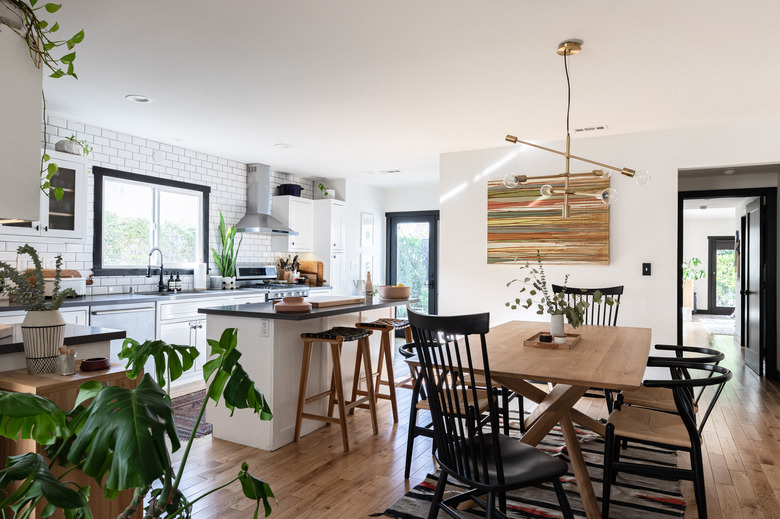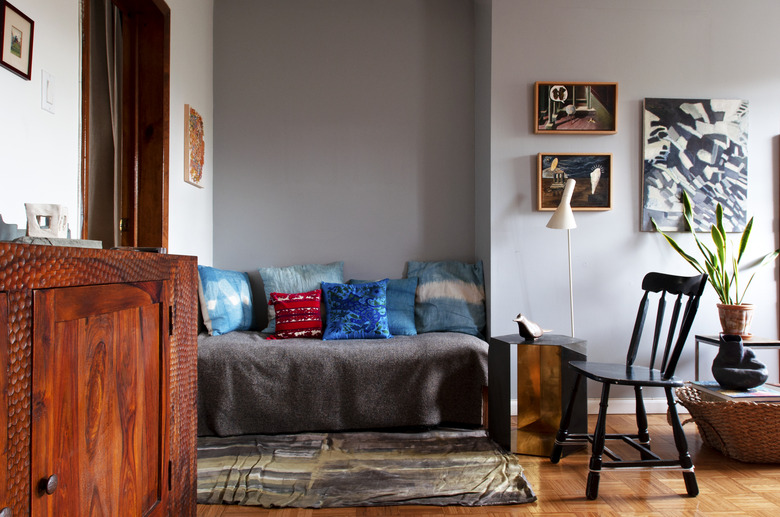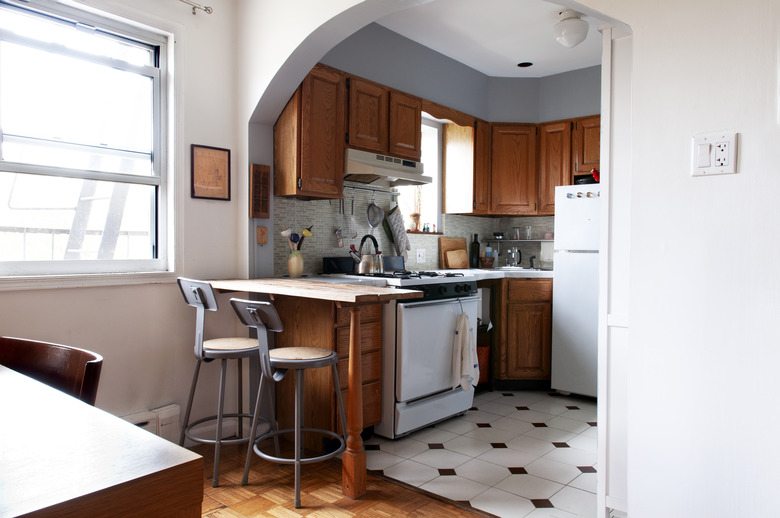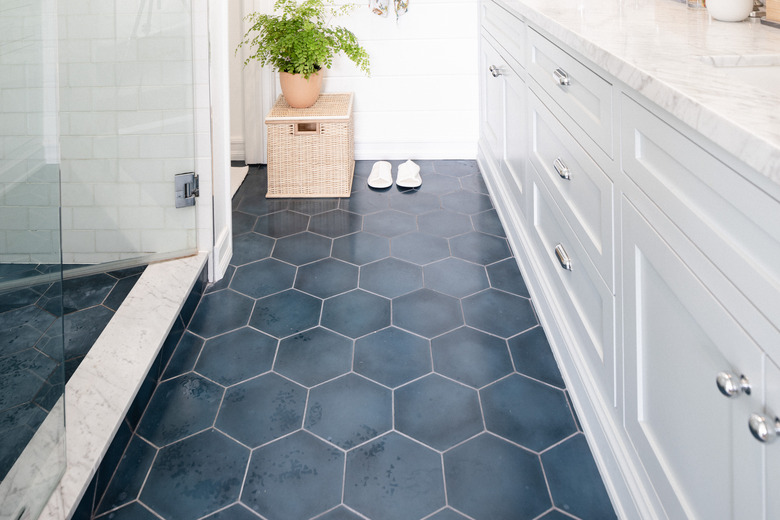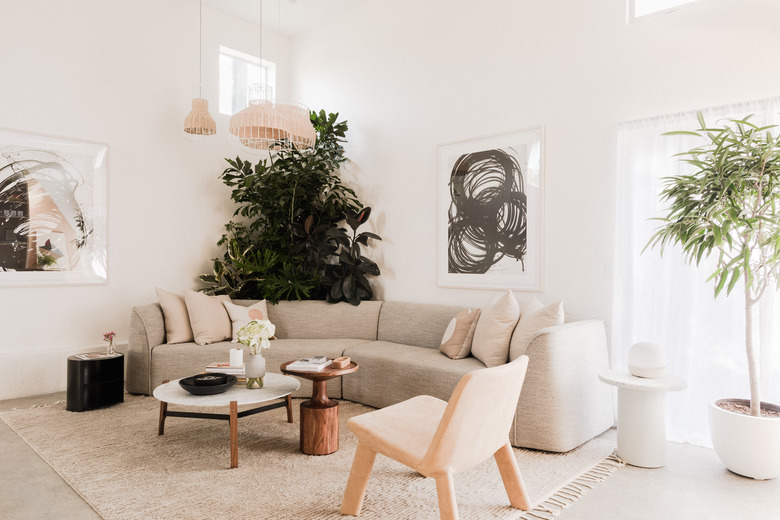The 10 Best Flooring Materials
- Choosing the right flooring material for your home
- Solid hardwood: the best whole-home flooring choice
- Engineered wood: more affordable than solid hardwood
- Bamboo flooring: benefits of hardwood at engineered wood prices
- Laminate flooring: unlimited design styles
- Vinyl flooring: durable enough for the toughest conditions
- Linoleum flooring: natural and versatile
- Ceramic tile: durability and versatility
- Cork flooring: sustainability and comfort
- Carpet: comfort and warmth
- Concrete: durable enough to last a lifetime
There are dozens of flooring materials available these days, ranging from stone tile to bamboo flooring and from carpeting to concrete. When it comes to the right flooring materials for your home, though, there is no single right choice. That's because each flooring type has its own benefits and drawbacks, with some options better suited for the kitchen and bathroom, while other choices are better for the living room or bedroom.
Choosing the Right Flooring Material for Your Home
When considering the right flooring options for your home, put a lot of thought into not only your aesthetic preferences but also your lifestyle and what happens in the rooms where it will be installed. Ask yourself these questions when considering the best flooring for your home:
- How long should it last? If you like to update your home regularly, durability doesn't matter
as much, but if you want something that lasts a lifetime, only a few options
will work. - How busy is the room?
High-gloss finish can wear off hardwood flooring, which may not be a problem
in a guest bedroom but isn't a great idea in a high-traffic area like the
entryway. - How much time are you willing to spend on upkeep? If you're busy and don't have time to do deep
cleaning all the time, then ceramic or porcelain tiles are great options. Don't
want to reseal the floor or grout every few years? Then you might want to go
with vinyl tile, which is not only easy
to clean but also requires practically no maintenance. - How much moisture is there in the air and the floor? Demanding conditions like humidity and
frequent spills require special flooring. This is why carpeting and solid
hardwood are rarely used in kitchens and bathrooms. - Are you planning to do a DIY install? Peel-and-stick vinyl is one of the easiest materials to
install, whereas traditional tile flooring requires a notably labor-intensive
installation process.
Solid Hardwood: The Best Whole-Home Flooring Choice
What it is: Solid pieces of wood are cut into flooring planks that are typically nailed down to a wood subfloor.
Cost: $5 to $10 per square foot including installation; however, prices can be drastically higher for rare or exotic wood species.
Pros: Solid wood is easy to clean, durable enough to last 25 to 100 years depending on the species and can be refinished many times. There is a wide array of hardwood species that can be stained, finished and texturized in seemingly endless combinations.
Cons: All hardwood flooring needs to be refinished periodically, and this can be expensive. Most species do not do well with humidity or moisture, which is why Consumer Reports warns that wood floors aren't well suited to areas like bathrooms and kitchens. Also, while wood is a naturally renewable resource, it is not always harvested in a sustainable manner.
Engineered Wood: More Affordable Than Solid Hardwood
What it is: Engineered wood is similar to solid hardwood flooring, only it is made up of a thin top layer of real wood glued to a backing made of plywood or high-density fiberboard.
Cost: $4 to $9 per square foot including installation
Pros: Because it has only a thin layer of real hardwood, engineered wood is cheaper than solid hardwood flooring. Engineered flooring is also somewhat more resistant to expansion and contraction than solid hardwood. Many types of engineered flooring can be installed as a floating floor, making for relatively easy DIY installation.
Cons: Engineered wood can only be refinished once or twice, meaning it doesn't last as long as hardwood. Also, because the backing is softer than solid woods, these floors dent more easily.
Bamboo Flooring: Benefits of Hardwood at Engineered Wood Prices
What it is: Bamboo flooring is made from strands or slices of bamboo that have been glued together into floor planks.
Cost: $4 to $9 per square foot including installation
Pros: Bamboo grows quickly, making it much more sustainable than wood. It can be just as easy to install as engineered wood and comes in an array of styles, which can even resemble many hardwoods. While the finish can be scratched just like hardwood, it is very dense and dent-resistant.
Cons: The glue used in some inexpensive bamboo flooring has carcinogenic chemicals, including formaldehyde, though this problem can be avoided by buying flooring certified by an independent party such as FloorScore or Greenguard. Bamboo is subject to the same vulnerabilities and maintenance issues as hardwood.
Laminate Flooring: Unlimited Design Styles
What it is: Laminate flooring is a type of wood flooring but is largely made with wood pulp and is more like hardboard than real hardwood flooring. It has a photographic layer that can mimic hardwood or other materials and is covered with a clear protective finish.
Cost: $3 to $7 per square foot including installation
Pros: Because it can look like a variety of materials (including natural stone, wood and brick), this is one of the most versatile flooring materials and can be made to fit with any decor style. Some high-quality laminates resist scratching and discoloration from UV light better than wood products. It is very easy to install, easy to maintain and easy to clean.
Cons: Repetitive patterns can make the image look fake, and cheap laminate wears out quickly. When the top layer wears through, laminate will need to be replaced.
Vinyl Flooring: Durable Enough for the Toughest Conditions
What it is: Vinyl flooring is made from multiple layers of PVC plastic and other synthetic materials.
Cost: $2 to $6 per square foot including installation
Pros: Vinyl offers a lot of variety when it comes to function and appearance. All vinyl is waterproof, and cushioned vinyl has a layer of foam in it, making it more comfortable for standing. Thick, luxury vinyl plank or tile flooring can have textures that make it look like hardwood or natural stone. Peel and stick is one of the easiest types of flooring to install, as are many luxury vinyl products that can be installed as floating floors. Vinyl holds up well against dents, moisture, heavy foot traffic, scratches, general wear, stains and discoloration from UV light and can last up to 20 years.
Cons: Top-of-the-line vinyl can be just as expensive as other flooring materials like hardwood and stone. Many vinyl floors contain high levels of phthalates, which can harm children's health and development, although Safer Chemicals, Safer Families says that the top home improvement stores have all committed to carrying only vinyl floors that do not have elevated levels of phthalates.
Linoleum Flooring: Natural and Versatile
What it is: Linoleum is similar to vinyl, only it is made from renewable and natural resources like cork and linseed oil.
Cost: $4 to $8 per square foot including installation
Pros: While linoleum flooring fell out of favor after vinyl became popular, concerns about chemicals in vinyl and new advances in linoleum have resulted in a re-emergence of this classic kitchen flooring material. Linoleum comes in a wide array of colors and patterns, feels nice underfoot and is very resistant to fading from UV exposure. It is more durable than vinyl, often lasting up to 40 years.
Cons: Linoleum is water-resistant but is not waterproof like many types of vinyl flooring. There aren't many linoleum manufacturers in the U.S. market, and products are not sold by many retailers.
Ceramic Tile: Durability and Versatility
What it is: Ceramic tile is a blend of clay and shale fired in a kiln. Porcelain tile is a type of ceramic made by adding feldspar to the clay and firing the tile at a higher temperature.
Cost: $5 to $15 per square foot including installation
Pros: Ceramic tiles can be designed with a wide number of colors and patterns, even mimicking the look of stone. Porcelain and glazed ceramic are waterproof and stain-resistant and can be cleaned easily. Porcelain is one of the most durable flooring materials and is resistant to dents, scratches and moisture.
Cons: Unglazed tile can easily be stained or damaged by water if not sealed regularly, and grout needs to be regularly sealed even when waterproof tiles are used. Many porcelain and glazed ceramic tiles can be very slippery when wet, and all types of tile are very hard, making falls particularly painful. Tile is cold underfoot, and standing for long periods is not comfortable. Installation is relatively complicated.
Cork Flooring: Sustainability and Comfort
What it is: Cork flooring is made from the bark of the corco tree, which is removed, boiled, ground and then compressed and glued into sheets before being baked in a kiln.
Cost: $4 to $11 per square foot including installation
Pros: Because it can be harvested without damaging the tree, cork flooring is very sustainable. The material is warm, quiet and feels soft underfoot. It looks natural, is slip-resistant and is easy to install yourself. It does well in high-humidity environments (but not wet areas like bathrooms).
Cons: Cork can be damaged by moisture, and it tears and dents easily. It may need to be resealed periodically to protect it from water damage and stains and should not be used in high-traffic areas like entryways or moisture-prone rooms like the kitchen or bathroom.
Carpet: Comfort and Warmth
What it is: Carpet is made from soft fibers like wool and nylon that are then pulled through a woven backing, which is then glued to additional layers of backing to strengthen it.
Cost: $2.50 to $14 per square foot including installation
Pros: Carpet is a favorite for rooms like living rooms and bedrooms because it is soft, quiet, slip-resistant and warm on which to walk. Many modern carpets are stain-resistant. Modern carpet tiles can be installed in areas where traditional carpeting was not an option, like the kitchen, since they can be removed, cleaned and dried easily.
Cons: While it's easy to get surface-level dust and dirt from carpet with vacuuming, steam cleaning is necessary to fully clean it, and carpet fibers can harbor allergens like pet dander and pollen. Some carpets are not stain-resistant, and the majority of carpet does not do well with moisture, so it should be avoided in the kitchen and bathroom. Overall, carpeting is not as durable as most other flooring materials.
Concrete: Durable Enough to Last a Lifetime
What it is: Concrete that has been sealed to work as a floor. Modern concrete floors can be stained, etched, textured, polished and more, creating a surprisingly wide array of looks.
Cost: $2 to $10 per square foot including installation, though highly embellished concrete floors can cost $30 per square foot or more
Pros: One of the most affordable flooring options, a homeowner with a subfloor in good condition can just seal it and have a functional concrete floor. Alternatively, concrete can be stained, acid etched, saw cut, polished, painted, texturized and more, creating a custom look that will suit even the most sophisticated home design. Concrete floors are nearly indestructible and can last as long as your home itself, although dropping a heavy object can chip the floor. When properly sealed, the material is easy to clean and is water- and stain-resistant.
Cons: Concrete flooring is hard and cold to the touch. The material must be resealed every few years, and if it is damaged, repairs can be difficult and expensive.
References
- RemodelingImage: Top 15 Flooring Materials: Costs, Pros & Cons
- HomeAdvisor: Best Flooring Types: Compare Top Materials & Options for Each Room
- Home Flooring Pros: Concrete Kitchen Floors – Pros & Cons, Ideas, Costs, Installation & Cleaning
- Money Crashers: 9 Best Flooring Options for Your Home & How to Choose on a Budget
- Consumer Reports: Best Flooring From Consumer Reports' Tests
- Consumer Reports: Flooring Buying Guide
- Safer Chemicals, Healthy Families: Success! – Home Improvement Retailers Follow Through on Commitments to Remove Phthalates from Flooring
